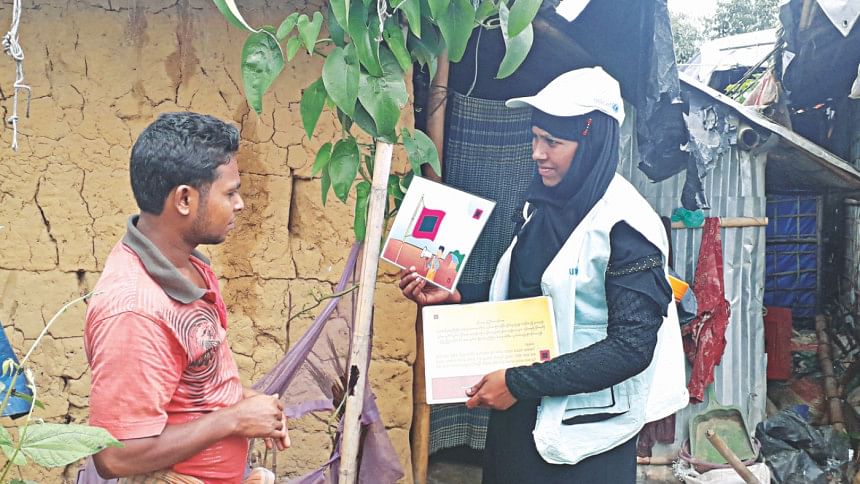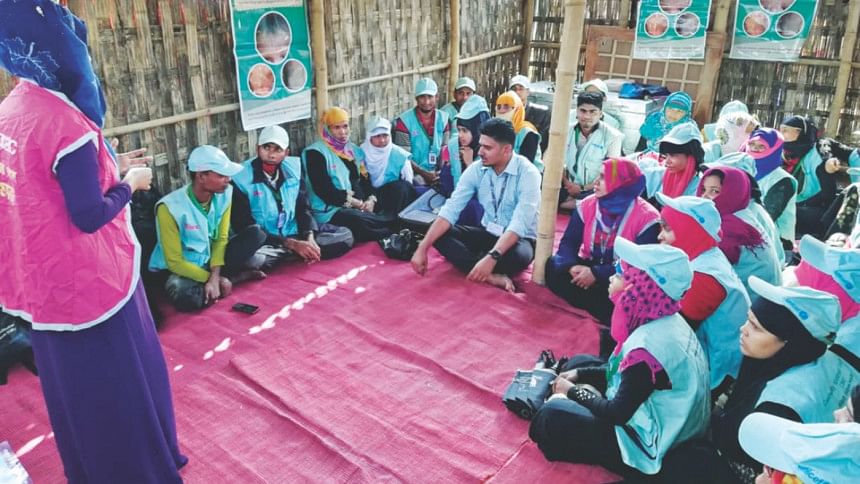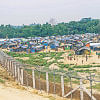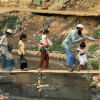For the good of the community

Waking up early in the morning, Jaheda Begum finishes her household chores quickly. Taking her breakfast, she comes out of her home in a Rohingya camp and rushes to a place where Rohingya women like her meet every day at 9:00am.
“There we get to know what is the message for the day. Then we will set out for the houses in the camps to disseminate the message among the Rohingya people till 5:00pm,” she said.
“We visit every house in my area and deliver messages on various issues. Now we are spreading the message on what to do in time of disasters.”
Jaheda is one of the 1,000 volunteers from the Rohingya community who regularly circulate lifesaving messages to the Rohingya people through door-to-door visits. They were given trainings and incentive for this task.
More than 90 percent of the volunteers are women who regularly pay visit to the houses in the camp. Volunteers hold meetings with the Rohingya people twice a month to solve the internal problems through discussions.
This is the community mobilisation volunteers network project, initiated by Brac in partnership with Unicef in November 2017 under Humanitarian Crisis Management Programme.
The project is for circulating lifesaving messages on health, hygiene, nutrition, child protection, gender-based violence and disaster preparedness through inter-personal communication sessions and other activities.
And it helped the Rohingyas in a big way.
“Last year when I was providing monsoon preparedness message, people of my block were becoming scared. But this year they seem quite confident to face any calamities … Now people are cautious and confident,” said Jaheda.
“I was driven out from Myanmar forcibly by the military; I was always in pain. It has been a great experience for me …
“I also keep an eye on my community households during heavy rain and if there is any cyclone forecast. I have provided monsoon preparedness messages to the Rohingya community. They have been benefited … Now they understand the cyclone flag.”

Heavy rain is a nightmare for people living in the hills, especially those in Cox’s Bazar, where thousands of acres of rich vegetation had to be cleared to make room for the Rohingya camps making the area prone to landslides.
With its long coastline and a landscape consisting of flat deltaic plains and sandy hills, Cox’s Bazar is highly exposed to natural hazards and extreme weather, including cyclones, torrential rain, landslides, flash floods, storm surges and extreme temperatures.
Between May 11 and December 31 last year, a total of 55,057 people in the Rohingya camps were affected by landslides and erosion, flash flood, storms and waterlogging, according to a report of UNDP.
Experts say Rohingyas do not want to leave even after disaster warnings are issued as they fear they might not get relief materials. So counselling of the Rohingya people and making them aware is the biggest challenge.
Bangladesh’s Refugee Relief and Repatriation Commissioner Mohammad Abul Kalam told The Daily Star that the initiative was very good as the Rohingya people are involved in making their own people aware on various issues.
“Communication is very important to reach a community during crisis moments. When there is a crisis, the Rohingya people will come forward to their fellow community members,” he said.
In the camps of one of the world’s most persecuted ethnic minorities, creating awareness is an effective way to avert natural disasters.
“We regularly develop messages assessing the needs of the community as they have been leading the community mobilisation in camps from the beginning of the new influx. We lead the campaigns on health awareness as well as collect feedback from the community during disasters to determine the need of community people,” Shamim Iftekhar, team lead of Brac’s communication for development programmme, told The Daily Star.
“The network has been formulated through overcoming many challenges especially the taboos held by the community people barring women from working outside. But now these women are transforming the community. We are planning to enhance Behavior and Social Change Communication for ensuring a better life for them,” he added.
Monira Begum, another community mobilisation volunteer, said when she campaigned, people asked her a lot of questions.
“People have curiosity regarding the symbol of signals and preparedness issues. I have already conducted more than 100 sessions with the community people on the signal system and preparation,” she said.


 For all latest news, follow The Daily Star's Google News channel.
For all latest news, follow The Daily Star's Google News channel. 








Comments